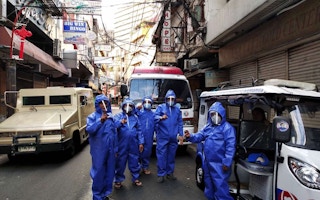Wearing a face mask, sanitising one’s hands, and using other protective equipment to stem the spread of the coronavirus have become essential for many people around the world.
To continue reading, subscribe to Eco‑Business.
There's something for everyone. We offer a range of subscription plans.
- Access our stories and receive our Insights Weekly newsletter with the free EB Member plan.
- Unlock unlimited access to our content and archive with EB Circle.
- Publish your content with EB Premium.
But the amount of waste being generated from single-use items is posing a huge threat to the environment, already reeling from rising temperatures and overpopulation.
While it is important to take personal precautions to protect against infection, are there eco-friendlier ways to do so?
In Southeast Asia, which witnessed a spike of new coronavirus cases this month, some resourceful citizens have improvised and come up with less carbon-intensive safety equipment and distribution.
Reusable eco-bag material used for protective suits in the Philippines
With hazmat suits and isolation gowns prioritised for hospital frontliners fighting Covid-19 in the Philippines, non-healthcare workers are exposed to the risk of contracting the virus.
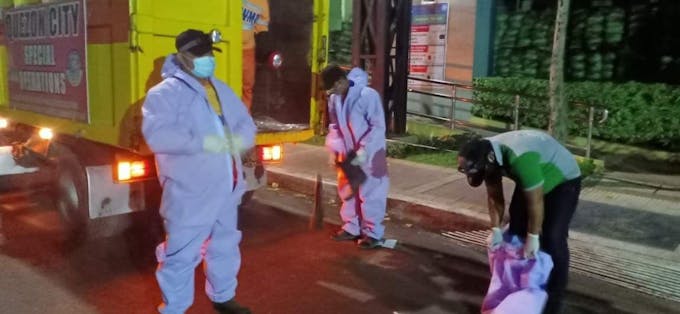
Street sweepers don the reusable protective suits in Quezon City, Philippines. Image: Crispian Lao
These are the country’s cleaners, policemen, firefighters and waste-pickers, whose work is all the more essential in an outbreak.
The Southeast Asian nation has one the highest number of coronavirus cases in the region, according to a tally by John Hopkins University. As of 20 April, it has seen over 6,000 cases and more than 400 deaths.
To do something for these unsung heroes, recycling advocate Crispian Lao rounded up his peers from the local recycling industry to identify a material that would protect responders while making the least impact on the planet.
In a period where health is the priority, it is still important to look at the materials being used for protecting ourselves, and see how they can be made reusable and recyclable.
Crispian Lao, founder, Philippine Alliance for Recycling and Materials Sustainability
They decided on nonwoven polypropylene—the same material used to make reusable shopping bags—and have set out to produce 10,000 non-medical grade coveralls, or jumpsuits, using the fabric by the end of April.
“In a period where health is the priority, it is still important to look at the materials being used for protecting ourselves, and see how they can be made reusable and recyclable,” said Lao, founder of the Philippine Alliance for Recycling and Materials Sustainability, a multi-sectoral organisation that aims to develop zero waste programmes.
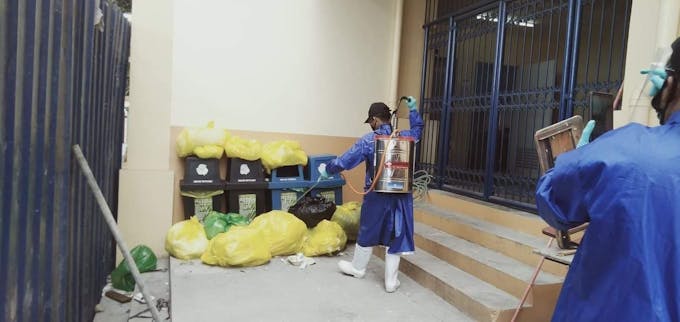
Hospital staff disinfects waste bins using reusable suit. Image: Crispian Lao
He told Eco-Business that although nonwoven polypropylene is made from thermoplastic polymer, it is recyclable and reusable, as the coveralls can be washed if they are used in minimal-risk areas.
The coveralls protect against potentially infected spray droplets and have some resistance to contaminants, but are not meant for responders who come into direct contact with infected patients, he added.
Lao said it costs only US$7 to make one jumpsuit; other improvised non-medical suits that use more expensive cloth cost double the amount.
As the government concentrates on providing more personal protective equipment to healthcare workers, Lao said the reusable coveralls that his team have created are the next-best option for other frontliners.
Thai monks turn plastic bottles into face masks
In a Buddhist temple in Thailand, monks are using plastic bottles to create face masks.
Wat Chak Daeng temple had already been gaining fame for making monks’ robes out of plastic bottles since late last year.
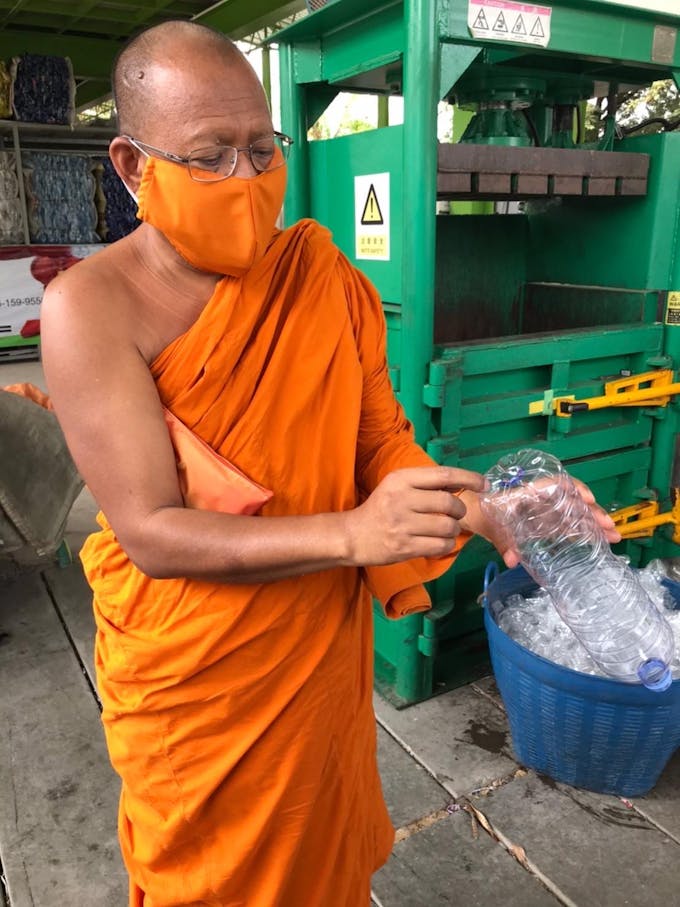
Phra Maha Pranom Dhammalangkaro, the abbot of the Wat Chak Daeng temple, wears a face mask made from recycled bottles. Image: The Government Public Relations Department of Thailand (PRD)
Found in the south of Bangkok, the temple encourages its devotees to donate their polyethylene terephthalate (PET) bottles, which are crushed and shredded by a machine owned by the monks.
Volunteer weavers at the temple turn them into polyester fibres that are blended with cotton to create a fabric that is then dyed saffron.
But as the pandemic threatens more lives—Thailand has had almost 3,000 confirmed coronavirus cases and almost 50 deaths, as of 20 April—the Buddhist monks have started to turn the cloth into face masks instead.
Using one 400 millilitre plastic bottle for every mask, volunteers can sew 100 face masks per day. The masks include an extra filter layer sewn on the inner lining for extra protection.
“It is important to make eco-friendly masks at this time (to) reduce the use of medical masks, which are reserved for healthcare workers. The cloth can be washed and reused, so it saves money as well,” Phra Pipakorn Ariyo, who leads the environmental activities in the temple, told Eco-Business.
Ariyo said that masks are also meant to be talismans offering good luck to whoever uses them. The monks have written Buddhist prayers in the masks to bless the wearer with good health.
“We make these masks mainly for the poor, who are not aware of what is happening, and who have no money to protect themselves,” he said.
BYO disinfecting scheme in Singapore
When rubbing alcohol and disinfectants quickly disappeared from supermarket shelves around the region, a philanthropic organisation stepped up to provide packaging-free sanitisers at no cost to residents in Singapore.
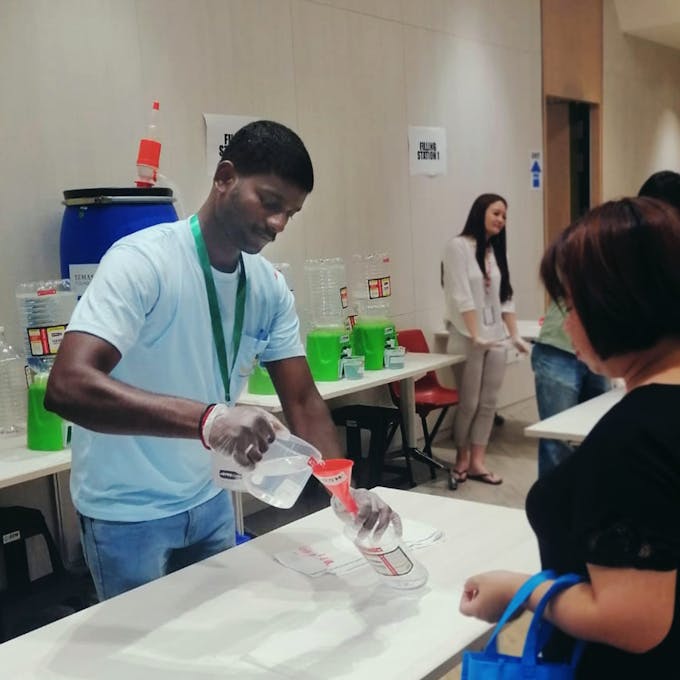
A volunteer at Nee Soon Central Community Club helped residents to fill up their bottles with the free hand sanitiser solution in March 2020. Image: Temasek Foundation
In March, Temasek Foundation offered half a litre of alcohol-free hand sanitiser to each of almost 1.5 million households through a bring-your-own-bottle (BYOB) scheme.
The foundation set up booths in designated shopping malls and public spaces, where residents lined up to fill empty shampoo bottles and other clean containers with 500 millilitres of sanitiser.
“This is part of a radical and comprehensive battle plan to enable our community to overcome Covid-19,” said Richard Magnus, chairman of Temasek Foundation Cares, in a statement.
“We are leaving no stone unturned and will continue to help build social resilience and instil public confidence during this uncertain period.”
As of 20 April, there have been more than 8,000 confirmed cases in the city-state.

